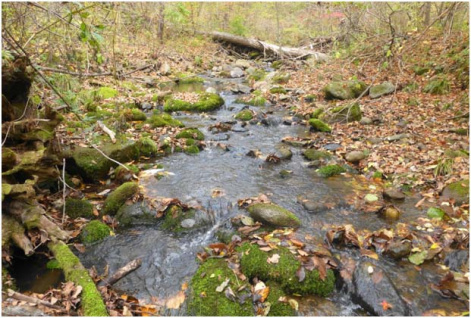River invertebrates refused to eat fallen leaves
17 June 2021 г.

Every autumn, leaves fallen from trees are eaten by insects, fungi and bacteria. But what happens to the leaves if they fall not on the ground, but in the water? In aquatic ecology, it is believed that in the upper reaches of rivers, where trees and shrubs grow densely along the banks, forming a canopy, a huge number of leaves falling into the water serves as a food source for many aquatic animals, primarily insect larvae and other invertebrates.
Russian scientists from Krasnoyarsk and Vladivostok have found that benthic invertebrates at the bottom of rivers hardly eat fallen leaves. And even if they do eat them, they ingest very little.
Biologists measured the content of fatty acids and the ratio of stable nitrogen and carbon isotopes in the larvae of mosquitoes, weevils, amphipods, algae, and the fallen leaves from the small forest stream Turova Pad. The study area was located in the Ussuriysk State Natural Reserve.
It turned out that the ratios of stable carbon isotopes in gammarus and mosquito larvae differ significantly from their content in leaves, but almost coincide with the ratios in algae. The analysis of biochemical markers and the ratio of stable isotopes in the leaves confirm that fallen leaves are of little value in terms of biochemical and elemental composition. The comparison of the ratios of nitrogen isotopes show that gammarus does consume fallen leaves, although in small quantities. At the same time, amphipod crustaceans do not ingest any useful organic substances from leaves, except for only one fatty acid.
It is obvious that benthic invertebrates in the Far Eastern forest stream receive organic carbon mainly from algae rather than from leaves found in a water body. It is algae that provides bottom animals with physiologically important polyunsaturated fatty acids such as eicosapentaenoic and docosahexaenoic.
“Our research can be considered as one of the elements of the“ puzzle ”of the cycle of substances, in particular, carbon cycle. From aquatic ecosystems, substances are constantly transported to land and back. We used the example of the Far Eastern forest stream to find out whether aquatic invertebrates feed on fallen leaves. Benthic invertebrates turned out to feed on algae, and they do not ingest carbon from leaf litter. This is understandable, the quality of algae is several times better than that of leaves. However, there were some surprises here as well. Gammarus nevertheless ate foliage and a very small part of the eaten biomass was used for metabolic needs, although they excreted most carbon back into the water, ” said one of the authors of the study, Olesya Makhutova, Doctor of Biological Sciences, Leading Researcher at the Institute of Biophysics of KSC SB RAS, Associate Professor at the Siberian Federal University.
The scientist noted that it is necessary to continue research aimed at a more accurate assessment of the real contribution of "alien" organic matter into the functioning of river ecosystems and, in particular, to carry out a comparative analysis of the data obtained in different regions and ecosystems.
Share:
